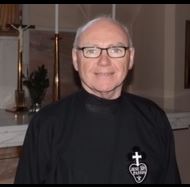I have just finished celebrating the 10 o’clock Mass on the Feast of St. Patrick. We were joined at the Mass by some of the pupils and staff from St. Mungo’s Primary School who are trying to come over more often during the season of Lent. Before Mass began, the children went around and handed all the people in the church, including me, a St. Patrick’s Day card which the children had made themselves. There were varying Irish themes on the cards and my own was of a lovely Irish dancer in full flow. After Mass the children were led over to the statue of St. Patrick and given a little lesson. I had found a lovely chasuble to wear that had sparkling threads of green, white and gold. As the children came out of the church after Mass one little girl looked up at me and asked me if I was the pope. The obvious answer was “not yet”. I was reminded however that the opening words of St. Patrick’s Confessions: “My name is Patrick, I am a sinner”, are very much reflected in those words of Pope Francis right at the beginning of his pontificate when he was asked by a journalist, “Who is Jorge Bergoglio”, and he quickly replied, “I am a sinner”. Truly good people know they are sinners because they know the holiness of God. I’m not so good, but still, “My name is Frank, I am a sinner”
Not that long ago most Catholics in Scotland would have had some kind of Irish heritage, and so, celebrating St. Patrick would have been understood as celebrating the roots of our faith. Nowadays, of course, Catholics in Scotland can come from every continent and island on the planet, which is a wonderful richness of diversity that we have yet to tap into fully. While I consider myself very much to be a Scot, at the same time I am proud of my Irish heritage. I had pause to think about this when I was doing my best to fill out the census form for myself and for our Passionist community in Bishopbriggs. In and around a host of questions about nationality and ethnicity, and linked perhaps to the question about religious affiliation, we are asked what nationality we most identify with. I hadn’t any hesitation in putting Scottish as my answer, but I have no doubt that a good number of Scottish Catholics will have put Irish, and that would be totally understandable. Father Lawrence, a proud Scot, had an Irish passport.
My main struggle with the census was to find where I fit in as a Catholic priest, but also as a non-salaried member of a religious order. In all the questions about employment history there is no place for actually being able to explain that this is who and what I am. I know that in the Irish census forms there is a box to tick marked “other”, which then opens up to allow you to elaborate, but such a facility doesn’t seem to exist on the Scottish census form. At one stage I found myself answering questions about my employment 50 years ago when I was working for Olivetti. I then decided that this was a bit daft, and so I went back and approached the questions another way, having taken some advice from someone whom I thought would know better than me. I have answered the questions, as have the rest of the community, as best, and as honestly as we can, and our census is now submitted with days to spare.
I do appreciate, however, what the census is, and what it hopes to achieve, and I have been indebted to the online Irish census of 1901/1911 in gleaning some helpful information about my Irish heritage. Having an unusual name like Keevins helps narrow down the parameters and I have been able to easily locate my County Sligo ancestors and I am interested to see how even Christian names have been consistently repeated down through the generations, even if there are signs that this will no longer be the case for future generations bearing the name of Keevins. If you haven’t already done so, enjoy filling out your census form.
So, as ever, protect yourselves, your loved ones, and others, and protect Christ in your lives.

 RSS Feed
RSS Feed
